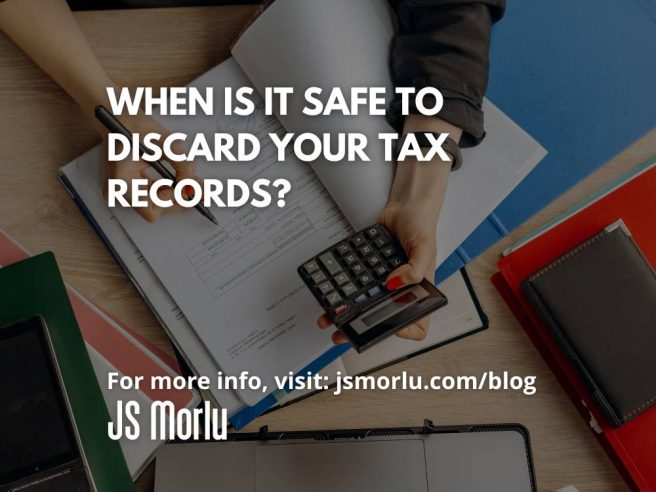As tax season comes to a close, many people start thinking about cleaning up and discarding old tax documents. But before you throw away those piles of paperwork, it’s important to understand that some records should be kept for longer than others. While most tax records can be safely discarded after the IRS statute of limitations period (usually three years), certain documents require more careful attention. In this blog, we’ll walk you through when to keep and when it’s safe to discard your tax records. Plus, we’ll explain why safely disposing of sensitive documents is a must for protecting your personal information.
Understanding the IRS Statute of Limitations
The IRS typically has a three-year window to audit or assess additional taxes on your returns. This means that, in most cases, tax records can be safely discarded after three years. However, this doesn’t apply to every document, and you should be aware of specific guidelines for retaining records related to certain assets.
Key Documents to Keep Longer Than Three Years
While the three-year rule works for most documents, there are exceptions that require you to keep your records for a longer period. Let’s break down the most common examples:
1. Home and Property Records
If you own property, whether it’s a primary residence or an investment property, you’ll need to keep your records for as long as you own the asset and beyond. This includes:
- Purchase documents: Keep all records related to the purchase of your home or rental property, including the closing statement, loan documents, and title information. These documents are crucial when you decide to sell the property in the future.
- Improvements and repairs: Any home improvement or repair work you do will increase the cost basis of your home, which affects your tax liability when selling. Keep receipts, invoices, and contracts for these improvements.
- Selling records: When you sell a property, you will need to keep the records related to the sale, including the sales contract and settlement statements. The IRS needs to know how much you paid for the asset and how much you sold it for to calculate any capital gains taxes due.
2. Investment Documents
Just like real estate, investments require careful record-keeping. Here’s what you need to retain:
- Investment purchases: Whether you’re investing in stocks, bonds, or mutual funds, keep records of what you paid for these assets. You’ll need this information to calculate capital gains when you sell.
- Sales records: When you sell an investment, you’ll need the records that show how much you paid for it and how much you sold it for. This will help determine whether you owe taxes on any profits.
Both home and investment records should be kept until after the asset is sold and the IRS statute of limitations expires for the year of sale. In some states, the statute of limitations is extended by an additional year, so it’s important to check your state’s regulations.
3. Extended Statutes of Limitations
The three-year statute of limitations is the general rule, but there are a few scenarios where this period may be extended:
- Underreporting of income: If you omit more than 25% of your income from your tax return, the IRS can extend the audit period to six years.
- Fraudulent returns: If you file a false or fraudulent return to evade taxes, the IRS has no time limit to assess additional taxes.
4. State-Specific Rules
Some states have their own statute of limitations that are longer than the federal period. Be sure to check with a local tax professional to understand the specific rules for your state.
The Importance of Shredding Sensitive Documents
When you’re ready to discard old tax records, it’s essential to protect your personal information. Documents that contain sensitive data like your Social Security number, driver’s license number, birth date, and other personal details should never be thrown away casually. Shredding these records is the safest way to dispose of them and protect yourself from identity theft.
When In Doubt, Hold On to It
If you’re ever uncertain about whether you should keep a document or not, it’s always a good idea to hold on to it for a little longer. The IRS could come back for a review, and having your records available will help ensure you have everything you need. Keeping documents longer than the minimum requirement also ensures that you’re prepared for any future audits or inquiries.
Final Thoughts
Organizing and discarding tax records may seem like a hassle, but knowing when and what to keep can save you a lot of time and money in the long run. Always remember the rule of thumb: most documents can be discarded after three years, but those related to your home, investments, and certain assets require a longer retention period.
By following these guidelines and properly disposing of sensitive documents, you can avoid unnecessary stress, potential penalties, and safeguard your financial security. Need more advice on tax record-keeping? Reach out to a professional tax advisor to help you navigate the rules and regulations specific to your situation.
JS Morlu LLC is a top-tier accounting firm based in Woodbridge, Virginia, with a team of highly experienced and qualified CPAs and business advisors. We are dedicated to providing comprehensive accounting, tax, and business advisory services to clients throughout the Washington, D.C. Metro Area and the surrounding regions. With over a decade of experience, we have cultivated a deep understanding of our clients’ needs and aspirations. We recognize that our clients seek more than just value-added accounting services; they seek a trusted partner who can guide them towards achieving their business goals and personal financial well-being.
Talk to us || What our clients says about us

